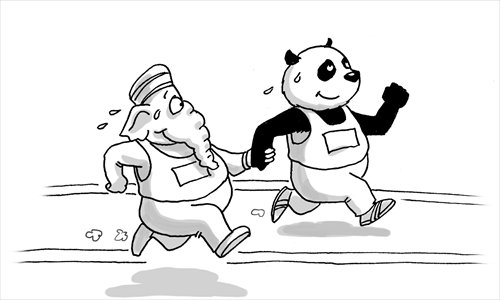Chindia can drive 21st century Asia

Illustration: Liu Rui/GT
Chinese President Xi Jinping's successful visit to Pakistan this week, especially his promise to invest over $46 billion, compared to $20 billion he promised for India last year, has briefly revived the perennial "Pakistan factor" of China-India relations and it is likely to color the thinking of Indian interlocutors as they prepare for the coming China-India summit in Beijing in May.
What makes China's continued indulgence of its "all-weather" strategic partner Pakistan seem such a formidable trend is the fact that, in the last five years, China's trade with Pakistan grew from $9 billion to $16 billion.
Meanwhile, the continued insurmountable Sino-Indian trade deficit, which has now risen to nearly $40 billion, has made India overcautious on all counts, be it China's financing of the China-Pakistan Economic Corridor, providing Pakistan with eight submarines, or various assessments on how US exit from Afghanistan will bring China and Pakistan even closer and eclipse India's unprecedented presence and investments in that country.
Though the Indian side will continue with its sworn policy of not discussing "Pakistan" with China, this high-profile visit of Xi to Pakistan will haunt its imagination and flexibility vis-a-vis Beijing. Knowing Prime Minister Narendra Modi's track record of deviating and emphatic language, this may even trigger some indirect reference to it and he may even offer some advice on how to address it.
Hopefully, given the Chinese track record, the leadership would understand India's sensitivities. This is also because China fully understands Modi's increasing eminence on the global scene and also the critical role that China and India must play in ensuring their unhindered rise as major players in the emerging geopolitics of Asia.
Besides, there are areas where China and India can evolve a shared understanding in addressing some of the challenges that flow from Pakistan's continued internal instability and economic crisis.
Chinese leaders have repeatedly sought cooperation from Pakistan in addressing challenges from the East Turkestan Independence Movement. India likewise also needs cooperation of Pakistan in addressing continued violence in Kashmir. Given that all three see themselves as victims of terrorism, there must be a possibility of evolving some innovative trilateral strategies in addressing this menace. As of now, though, their perspectives continue to have enormous differences that need to be narrowed.
Both China and India fully understand that their rapid development is not possible without peaceful and stable neighborhood and how their rise remains integral to the progress made by their respective co-prosperity spheres. The fact that their co-prosperity spheres overlap a great deal provides them with shared responsibilities in developing not just bilateral cooperation but also planning joint strategies for various regional problems.
Shared infrastructure development may be one sure way of addressing these challenges. India shares this broader understanding and the two have developed a close partnership in forums like RIC (Russia-India-China), BRICS and elsewhere. India has become a founding member of China's Asian Infrastructure Investment Bank.
The two have also evolved a shared understanding on developing the Bangladesh-China-India-Myanmar Economic Corridor. But the two also continue to carry the baggage of history, and their continuing irritants like repeated border incursions create extra difficulties on issues like the "One Belt and One Road" scheme, which can go hand in hand with India's Mausam and Spice Route projects.
Given that both Xi and Modi see themselves as ordained to lead their national revival for at least a decade, patience and perseverance can surely make the twain meet on many more issue areas, reinforcing the Chindia paradigm as the driving force of the 21st century Asia.
The author is a professor of diplomacy & disarmament at Jawaharlal Nehru University, New Delhi. opinion@globaltimes.com.cn